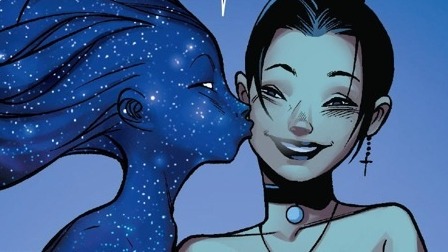A new series of prints by artist Roger Peet aim to address a tricky topic: cultural appropriation. In his series In//Appropriate, which debuted at Portland State University’s Littman Gallery this month, Peet printed images of white Americans engaging in cultural appropriation in black ink on tall banners. Frozen in time, Miley Cyrus joyfully twerks with her tongue in its signature position, a hipster wears a keffiyeh, and Katy Perry smiles in her American Music Awards geisha costume. Behind them, another vision of whiteness—a violent one—is printed in red: Miley is starkly framed against a scene of police in Ferguson, a bohemian white girl in a feathered headdress is juxtaposed with an iconic photo of a mountain of buffalo skulls.
To accompany the images, Peet constructed special glasses made from cardboard and red plastic. These are “whiteness goggles,” a sign explains. When you put them on and look at the images, suddenly the red, violent image disappears. Viewers are left with just the visions of Miley, Katy Perry, and Elvis with none of the violence behind them. The viewers are forced to consider the blinders that race creates: one of the privileges of being white is the ability to ignore racism. All too often, the reality of the white supremacy is rendered invisible to people who don’t want to see it.
“When you put on the Whiteness Goggles, the colonial, military and police violence that underpins casual cultural consumption disappears,” explains Peet, in his artist statement of the project. Peet himself is a white immigrant to the US from Britain—he works as a politically minded printmaker with the Justseeds Collective. In addition to well-known celebrities engaged in cultural appropriation, the In//Appropriate show includes an image of Peet, foregrounded holding an American flag against a backdrop of the war in Vietnam and Afghanistan. Including himself in the show was important, Peet says, to show that as a white person coming from England, he faced few hurdles in immigrating to the United States. “I was welcomed with open arms,” he says—a contrast to the racial stereotyping many people of color face when they immigrate the US.
Read more about the show—and listen to voicemails from people calling in to discuss cultural appropriation—on Peet’s Tumblr.



